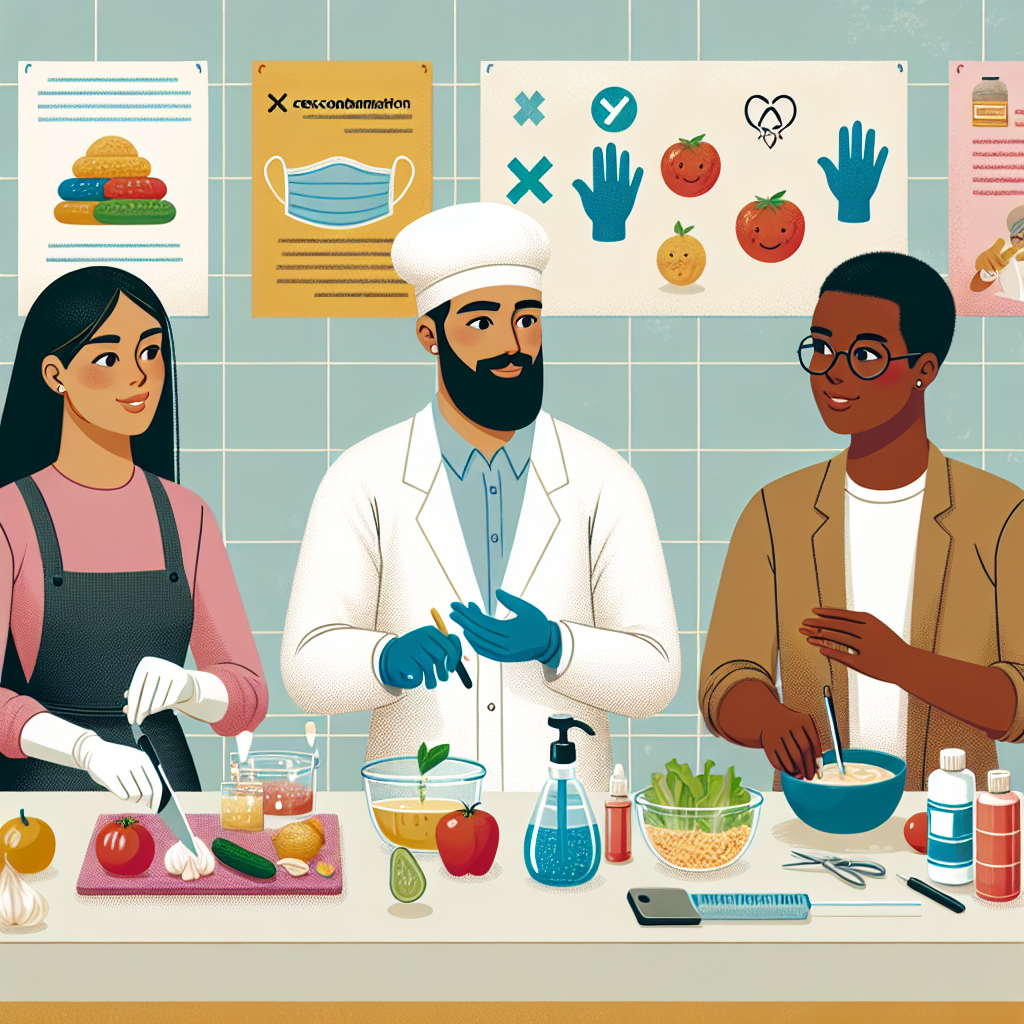Empowering Individuals to Adapt Food Safety Practices
-
Table of Contents
- Food Safety Practices: Empowering Individuals for Healthier Lives
- The Importance of Food Safety
- Challenges in Food Safety
- Strategies for Empowering Individuals
- Educational Initiatives
- Improving Food Labeling and Transparency
- Access to Safe Foods
- Regulatory Oversight and Support
- Conclusion: Key Takeaways for Safer Food Practices
- Enhance Your Diet with ETprotein’s Safe and High-Quality Protein Products
Food Safety Practices: Empowering Individuals for Healthier Lives

Food safety is a critical concern that affects everyone. From the farm to the table, ensuring that the food we consume is safe and free from contaminants is essential for preventing foodborne illnesses and maintaining overall health. Empowering individuals to adapt food safety practices is not just a matter of personal well-being; it’s a public health imperative. This article explores the importance of food safety, the challenges faced by consumers, and practical strategies to enhance food safety practices at an individual level.
The Importance of Food Safety
Foodborne diseases are a significant public health burden worldwide. According to the World Health Organization (WHO), an estimated 600 million – almost 1 in 10 people in the world – fall ill after eating contaminated food, and 420,000 die every year. These statistics underscore the critical need for effective food safety practices.
Food safety involves handling, preparing, and storing food in a way that reduces the risk of individuals becoming sick from foodborne illnesses. Contaminants can include biological pathogens like bacteria, viruses, and parasites, as well as chemical and physical contaminants.
Challenges in Food Safety
Despite the known risks, many individuals face challenges in implementing food safety practices. These challenges include:
- Lack of awareness about food safety standards and guidelines.
- Insufficient knowledge on how to properly handle and prepare food.
- Difficulty in identifying food that may be unsafe due to labeling issues or lack of transparency in the food supply chain.
- Economic constraints that limit access to high-quality, safe foods.
Addressing these challenges requires a concerted effort to educate and empower consumers to make informed decisions about the food they eat and how they handle it.
Strategies for Empowering Individuals
Empowering individuals to adapt food safety practices involves a multi-faceted approach that includes education, access to resources, and support from public health organizations. Here are some strategies that can be implemented:
Educational Initiatives
Education is the cornerstone of empowering individuals to make safer food choices. This can include:
- Public health campaigns to raise awareness about the importance of food safety.
- Workshops and cooking classes that teach safe food handling and preparation techniques.
- Online resources, such as websites and apps, that provide information on food safety.
Improving Food Labeling and Transparency
Clear and accurate food labeling can help consumers make informed choices about the food they purchase. Efforts to improve labeling standards can include:
- Regulations that require comprehensive ingredient lists and allergen information.
- Labels that indicate proper storage and handling instructions.
- Use of technology, such as QR codes, to provide additional information about the food’s origin and safety.
Access to Safe Foods
Ensuring that all individuals have access to safe, high-quality foods is essential. This can be achieved through:
- Supporting local agriculture that adheres to safe farming practices.
- Programs that provide economically disadvantaged individuals with access to safe and nutritious foods.
- Initiatives that reduce food deserts and increase the availability of fresh produce in urban areas.
Regulatory Oversight and Support
Government agencies play a crucial role in food safety by setting standards and conducting inspections. Strengthening regulatory oversight can involve:
- Regular inspections of food production facilities and restaurants.
- Enforcement of food safety regulations and penalties for non-compliance.
- Support for research into new food safety technologies and practices.
Conclusion: Key Takeaways for Safer Food Practices
Food safety is a shared responsibility that starts with each individual. By increasing awareness, improving access to resources, and supporting regulatory frameworks, we can empower individuals to make safer food choices. Remember to:
- Stay informed about food safety guidelines and best practices.
- Handle and prepare food with care, following proper hygiene and cooking techniques.
- Choose foods that are transparently labeled and sourced from reputable suppliers.
- Advocate for policies and programs that promote food safety and access to safe foods.
By taking these steps, we can contribute to a healthier society and reduce the incidence of foodborne illnesses.
Enhance Your Diet with ETprotein’s Safe and High-Quality Protein Products
As you focus on food safety and nutrition, consider incorporating ETprotein’s range of protein products into your diet. ETprotein is a trusted manufacturer and supplier of organic bulk vegan proteins and L-(+)-Ergothioneine (EGT), offering products that are non-GMO, allergen-free, and of the highest purity. Their protein options, including rice, pea, and various seed proteins, cater to diverse dietary needs and preferences, ensuring that you can maintain a safe and nutritious diet without compromising on quality or taste.
About ETprotein:
ETprotein, a reputable protein and L-(+)-Ergothioneine (EGT) Chinese factory manufacturer and supplier, is renowned for producing, stocking, exporting, and delivering the highest quality organic bulk vegan proteins and L-(+)-Ergothioneine. They include Organic rice protein, clear rice protein, pea protein, clear pea protein, watermelon seed protein, pumpkin seed protein, sunflower seed protein, mung bean protein, peanut protein, and L-(+)-Ergothioneine EGT Pharmaceutical grade, L-(+)-Ergothioneine EGT food grade, L-(+)-Ergothioneine EGT cosmetic grade, L-(+)-Ergothioneine EGT reference grade and L-(+)-Ergothioneine EGT standard. Their offerings, characterized by a neutral taste, non-GMO, allergen-free attributes, with L-(+)-Ergothioneine purity over 98%, 99%, cater to a diverse range of industries. They serve nutraceutical, pharmaceutical, cosmeceutical, veterinary, as well as food and beverage finished product distributors, traders, and manufacturers across Europe, USA, Canada, Australia, Thailand, Japan, Korea, Brazil, and Chile, among others.
ETprotein specialization includes exporting and delivering tailor-made protein powder and finished nutritional supplements. Their extensive product range covers sectors like Food and Beverage, Sports Nutrition, Weight Management, Dietary Supplements, Health and Wellness Products, and Infant Formula, ensuring comprehensive solutions to meet all your protein needs.
As a trusted company by leading global food and beverage brands and Fortune 500 companies, ETprotein reinforces China’s reputation in the global arena. For more information or to sample their products, please contact them and email sales(at)ETprotein.com today.












